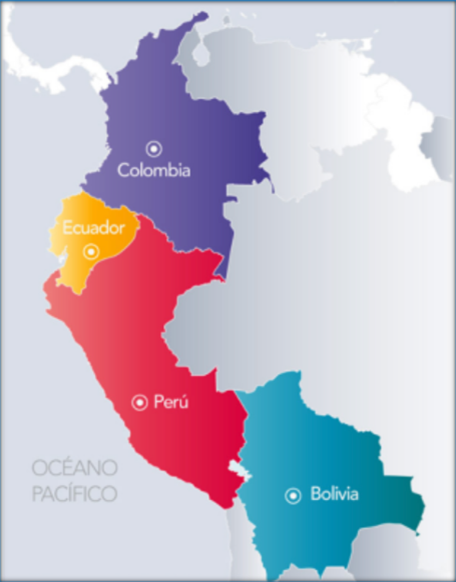Comunidad Andina
(CAN)RPPO contact
Sra. Rojas Quiroga Katty Guadalupe
Responsable Especialista de Sanidad Vegetal
Comunidad Andina CAN
Av. Paseo de la República 3895,
San Isidro, Lima.
Perú
Phone:
(511) 7016400
Mobile:
+591 79378126 ; +51 968372436
Courriel: [email protected]
Alternate Email:
[email protected]
Langues de préférence:
Spanish
Site web:
https://www.comunidadandina.org/
Date contact registration:
24 Fév 2022
The General Secretariat of the Andean Community, together with the Andean Technical Committee for Agricultural Health (COTASA), made up of the Official Agricultural Health Services of the Member Countries, seeks the development of standards, common programs and projects of regional impact to maintain and improve the competitiveness of agricultural production through the improvement of the phytosanitary condition of the region and prevent the entry of quarantine pests that constitute risks to agriculture and could affect intraregional and international agricultural trade. The Andean work on plant health can be summarized in four main aspects, interrelated, which are: Phytosanitary measures, Pests of regional interest, Registration of chemical pesticides for agricultural use and Activities in international forums.
VISION
The General Secretariat, through the missionary activities it carries out, seeks to contribute to the development of the member countries and the improvement of the quality of life of the more than 111 million citizens of Bolivia, Colombia, Ecuador and Peru.
MISSION
The General Secretariat, as the executive and coordinating body of the SAI Andean Integration System, has the mission of managing the process of Andean subregional integration, of resolving the issues submitted to its consideration, of ensuring compliance with community commitments and with the capacity to present initiatives and proposals for Decisions. The General Secretariat acts solely based on the interests of the subregion.

Website:
https://www.comunidadandina.org
Objectives
Through Decision 515, the Andean Agricultural Health System SASA is created as the set of principles, elements and institutions, responsible for the harmonization of sanitary and phytosanitary standards; the protection and improvement of animal and plant health; to contribute to the improvement of human health; of the facilitation of trade in plants, plant products, regulated articles, and animals and their products; and to ensure compliance with the sanitary and phytosanitary regulations of the Andean legal system.
The objectives of SASA are:
- Prevent and control pests or diseases that represent a risk to agricultural health in the Andean Community.
- Serve as a mechanism for the harmonization of legislation on agricultural health.
- Facilitate intrasubregional trade and with third countries of plants, plant products, regulated articles, animals and their products, preventing sanitary and phytosanitary measures from becoming disguised restrictions on trade.
- Implement sanitary and phytosanitary programs, activities and services aimed at increasing agricultural production and productivity, as well as promoting favorable sanitary and phytosanitary conditions for the sustained development of Andean agricultural exports.
- Promote the adoption of joint positions on technical-scientific or commercial issues in agricultural health, before the different international negotiation forums, international organizations competent in animal and plant health and with third countries.
Resolución 1478 Glosario Andino de términos sanitarios y fitosanitarios
Decision 515 Sistema Andino de Sanidad Agropecuaria
Categorias de riesgo fitosanitario para el comercio intrasubregional y con terceros países de plantas, productos vegetales y otros artículos reglamentados
Resolución 025 Norma Andina relativa al análisis de riesgo de plagas
Resolución 419 de la Junta del Acuerdo de Cartagena
Resolución 431 de la Junta del Acuerdo de Cartagena
Resolución 240 Reglamento andino relativo a los permisos fitosanitarios de importación.
------
NEWS:
Memorando entendimiento FAO - CAN



